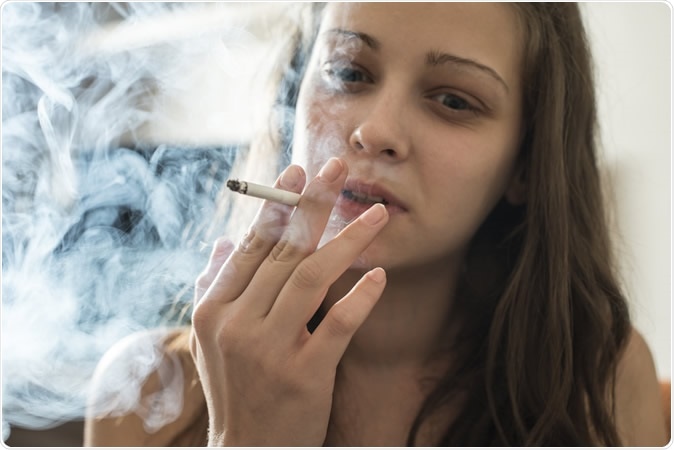Many people think that smokers who are not smoking for a while – perhaps because they are in a smoke-free setting or can’t smoke for some reason – tend to eat more instead. But this study from the University at Buffalo says not.

Image Credit: Degimages / Shutterstock
Smoking is an extremely addictive activity, and quitting is typically unsuccessful. This could be so because smokers are less motivated to seek a non-nicotine reward compared to the cigarettes, and this gap only increases when they stop smoking. This may shift the balance towards smoking again. Some studies have found that female smokers experienced a greater reward with snacks during abstinence compared to smoking periods, and this was also greater than that experienced with nonsmokers. The current study was aimed at finding out whether food has greater reward value during smoking and abstinence periods.
Researcher Stephen Tiffany says, “We found with this sample in this study that the motivations for cigarettes, food and water do not interact very much. Smoking abstinence does not affect the motivation for food and water.”
How was the study performed?
The study was based on the Choice Behavior Under Cued Conditions (CBUCC) research situation, which introduces cues – things that remind the individual of cigarettes or smoking – to induce craving, but which prevents the use of cues to satisfy the craving. The behavior of the individual presented with cues is then observed. It’s mostly verbal behavior, but typically the actual action is not observed. This helps assess the sources of motivation as well as behaviors associated with the use of addictive drugs like craving and seeking.
In this study the researchers included 50 smokers, in two sessions; the first, when they were first instructed not to smoke for 12 hours, and then a second session where they were allowed to smoke until the time of the visit. The setting was a chair facing a box with a sliding door that contained their favorite brand, a candy bar or a glass of water. They were provided with money to buy these things or to keep. The scientists claim that having money to spend on real food or water or cigarettes could increase the accuracy of the findings. The money spent with each cue gives a good idea of its independent reward value.
Once a preset tone was heard, the person saw what was in the box through the locked door, and then scored how much they craved cigarettes and food, on a scale of 1 to 7. They then decided how much they would be willing to spend to sample it, between 1 and 25 cents. The more they spent, the greater was their chance of having the door unlocked. The greatest probability was 95%. If they succeeded in getting access to the item, they could enjoy a single sip, bite or draw of the water, candy or lighted cigarette. This reflected the fact that satisfying a craving had a cost, as in real life, according to Tiffany. There were 12 trials in each session.
Prior research by Tiffany has shown that smokers are willing to spend more for cigarettes than water. In the current study he wanted to see whether food had a similar relationship. Some scientists think that when a smoker can’t smoke, food gains greater interest, but others say it is the opposite – it loses its value in keeping with the increased craving for cigarettes. However, he observed that body weight in smokers is typically lower, but quitting is associated with weight gain. He says, “There are interesting relationships between food and smoking, and smoking and weight.”
What did the analysis show?
The present research shows that the value of the reward for spending cash is highest with cigarettes in both settings, but increases significantly during the abstinence period. However, this was not observed with food or water.
Cigarette craving became stronger in response to cigarette cues compared to water cues, and after abstinence. Women tended to crave cigarettes less when they saw a food cue, but not men. Food craving was stronger in the presence of a food cue compared to a water cue, but weaker than cigarette craving. All subjects craved cigarettes more than food when all cues and both abstinence/nonabstinence conditions were analyzed together.
However, in the current study, smokers who were allowed to smoke spent on cigarettes rather than food, and on food rather than water, when presented with the corresponding cues. Following abstinence, they spent even more on cigarettes but their spending remained the same for food or water. Thus smokers have a greater motivation for cigarettes compared to food, and this does not shift towards food even when they cannot use cigarettes. This is counter to other studies which show that reward value for non-cigarette cues decrease during abstinence.
Conclusion
In other words, Tiffany says, “When people are abstinent from cigarettes their craving tends to go up, but they don't become hypersensitive to the cue.” Cues that remind one of smoking are difficult for smokers to handle, as they drive the craving and decide what choices they make. When a person who wants to quit relapses, for instance, it is due to the presence of a chance to satisfy the craving which in turn has been set off by a cue. However, food craving in abstinent smokers is driven independently, it appears from the current study.
Much more work is needed in this area due to study limitations. For instance, the time of abstinence may have been too short; food-to-cue intervals were not standardized; and the choice of food cue was limited. Future studies will help to clearly define the factors which drive motivation to smoke.
The study was published online on August 30, 2019 in the journal Drug and Alcohol Dependence.
Source:
Journal reference:
Comparing the reward value of cigarettes and food during tobacco abstinence and nonabstinence. Jennifer M.Betts & Stephen T.Tiffany. Drug and Alcohol Dependence. Volume 204, 1 November 2019, 107475. https://doi.org/10.1016/j.drugalcdep.2019.04.040, https://www.sciencedirect.com/science/article/pii/S0376871619302340?via%3Dihub